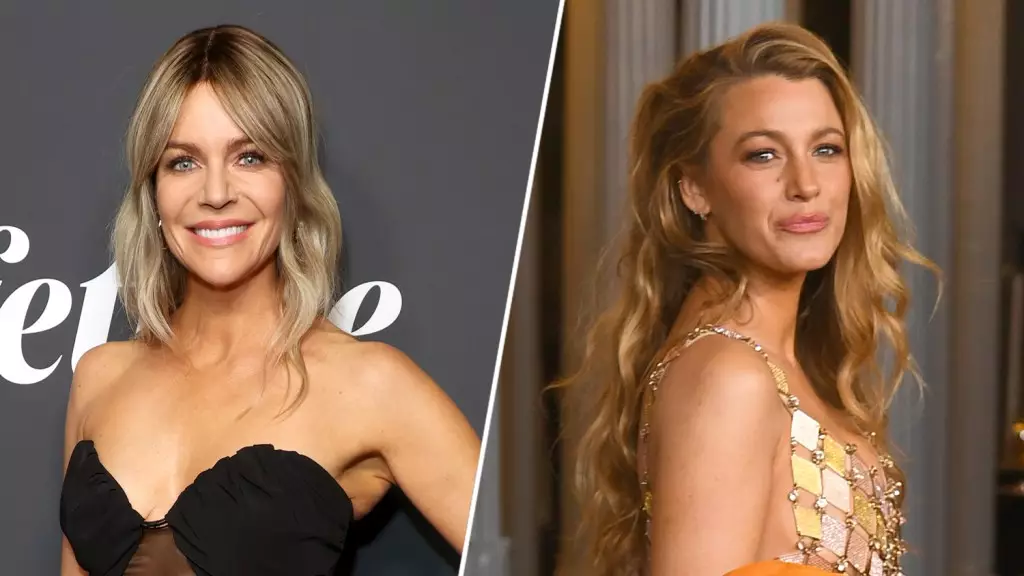The entertainment industry has long been a hotspot for controversies surrounding misconduct, but the recently surfaced allegations involving actress Blake Lively and director Justin Baldoni present a compelling case of retribution and challenge to power dynamics. The situation escalated when Lively publicly accused Baldoni—also her co-star in the film “It Ends With Us”—of sexual harassment and retaliation, claiming a systematic attempt to damage her reputation.
Kaitlin Olson, a well-known actress and a three-time Emmy nominee, has stepped into the fray, demonstrating solidarity with Lively by endorsing her character as “kind” and “generous” through her social media channels. Olson’s support, particularly because of her connection to both Lively and Baldoni via their spouses—Ryan Reynolds and Rob McElhenney, respectively—adds an interesting layer to the discourse. As multiple actors and friends publicly lend their voices in support of Lively, the question arises about how the industry is grappling with allegations of sexual misconduct and their implications for those involved.
In a detailed civil complaint filed with the California Civil Rights Department, Lively brought to light what she describes as a “hostile work environment” that nearly derailed the film’s production. The allegations delve into claims that Baldoni and his associates engaged in a multifaceted smear campaign against her. Lively asserts that this campaign was orchestrated to undermine her credibility and discourage other potential accusers. Such serious claims against a prominent figure in Hollywood are indicative of a broader pattern that seeks to discredit voices of dissent.
Lively’s legal action, described in an 80-page complaint, is not merely a personal vendetta but a pointed critique of a systemic issue pervasive in Hollywood: the intimidation faced by individuals who dare to speak out against powerful figures. Lively articulated her hope that her actions would enable protections for others who are similarly targeted, aiming to illuminate the dark tactics often utilized in the film industry.
In response to Lively’s accusations, Baldoni’s representatives dismissed the claims as “completely false” and an outright ploy designed to harm his public image. His attorney, Bryan Freedman, indicated that the allegations were exaggerated, aiming to perpetuate what he referred to as a false narrative. Baldoni’s approach underscores a common pattern in such disputes: when faced with accusations, the accused often attempt to delegitimize the claims instead of addressing their validity.
As the embers of this controversy smoldering, Baldoni is preparing to pursue a counter-lawsuit, an indicative move within legal frameworks that allows one party to retaliate against the damages claimed by another. Reports suggest that he may allege that Lively herself orchestrated a smear campaign, a reversal that speaks to the chaotic nature of these disputes where the narrative can quickly shift.
Moreover, the legal challenges are not confined to Lively and Baldoni alone. Stephanie Jones, who founded Baldoni’s former PR company, has also filed her own lawsuit, adding yet another layer of complexity to the situation. This cycle of accusations, counter-accusations, and the involvement of multiple parties underscores an intricate web of relationships and reputations that are being challenged.
As ongoing litigation unfolds, this case will not only impact the individuals involved but also reflect on Hollywood’s social fabric, revealing the consequences of unchecked power and the behavioral norms that have historically gone unchallenged. Public opinion will play a crucial role as more details emerge, shaping the narrative based on collective beliefs surrounding accountability and consequences for misconduct.
The implications of this controversy stretch far beyond the immediate parties and symbolize a broader reckoning for an industry grappling with issues of consent, power dynamics, and the treatment of women. As voices amplify against abuse of power, the stakes are raised significantly. Those watching may question whether this will signal a shift in how allegations of this nature are treated moving forward, or if the entrenched systems will continue to exert their influence.
The Blake Lively and Justin Baldoni allegations highlight a complex interaction of individual rights, gender dynamics, and the legal system’s role in addressing power disparities, a conversation that is far from resolved. The unfolding drama not only captivates public interest but also compels a reflective discourse on the ethical responsibilities of the entertainment industry.


Leave a Reply